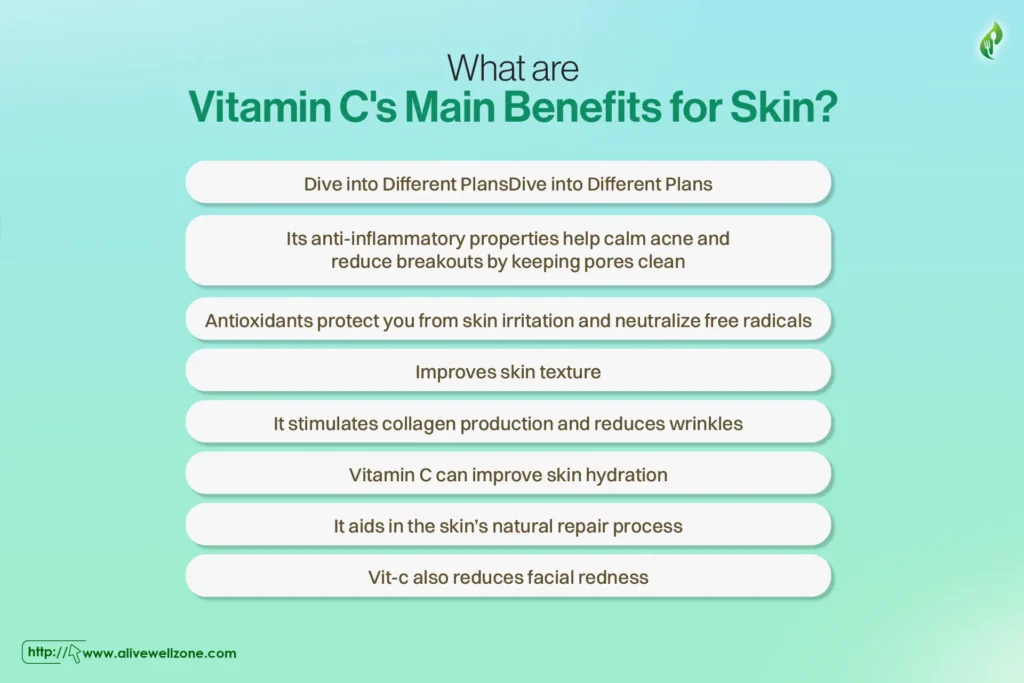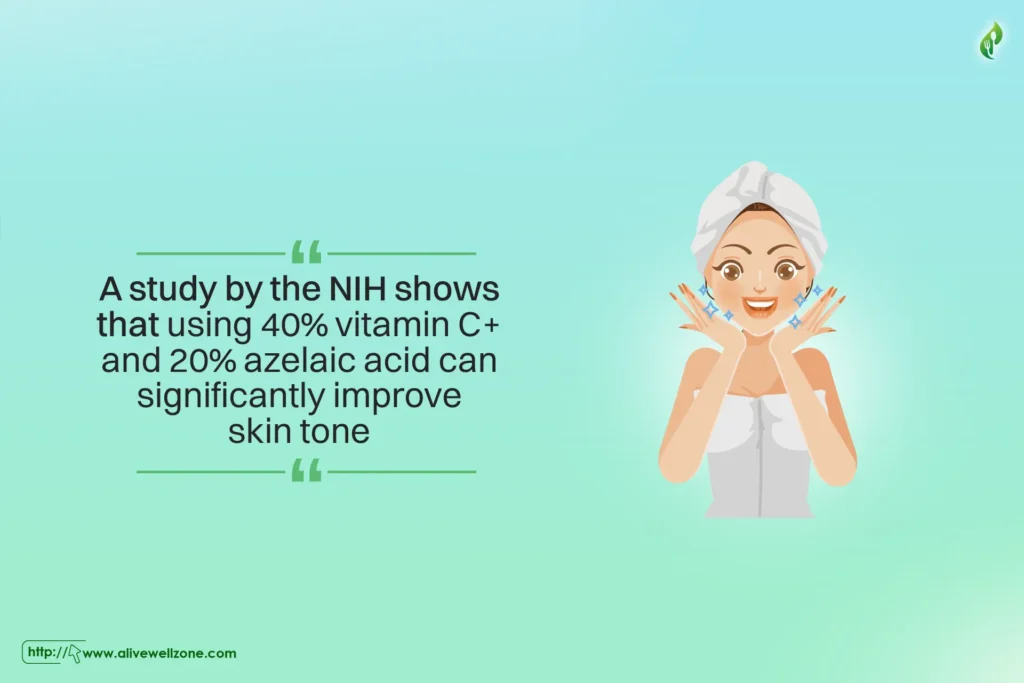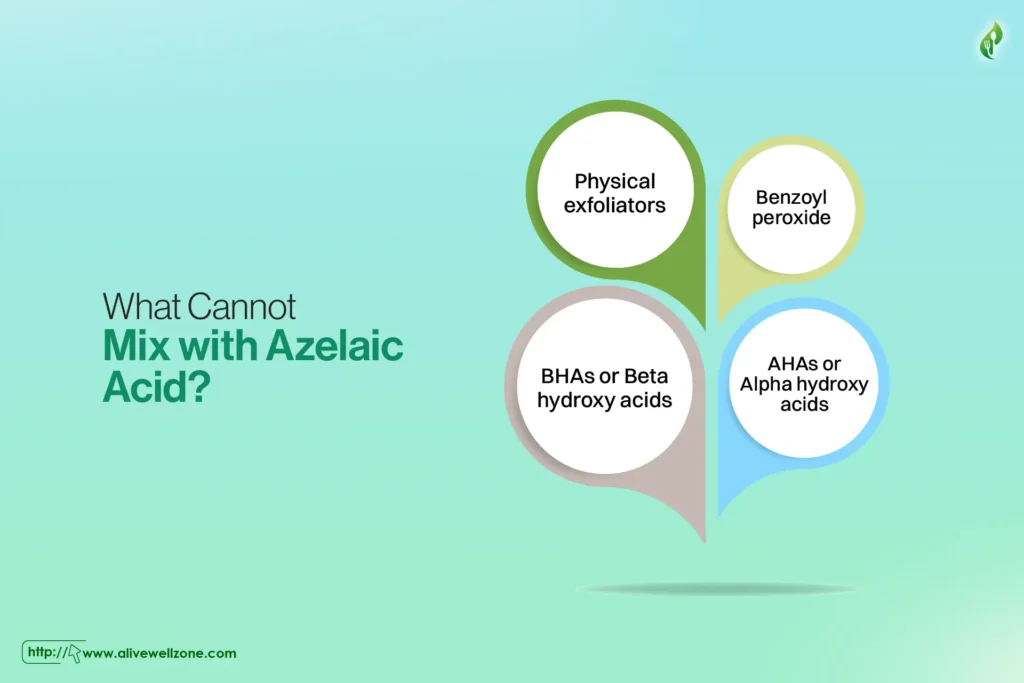Last Updated on August 30, 2025 by Helena Akter
Vit C and azelaic acid are common ingredients to remove dark spots and improve skin tone. While both are used for the same purpose, many think using them together can improve their effectiveness.
So what do you think? Can you use vitamin C with azelaic acid? Yes, you can. There are no side effects from using vitamin C and azelaic acid together. Instead, combining these two can speed up your skin’s exfoliation process.
However, not all skin types may react the same way. Some individuals with sensitive skin might experience irritation. But don’t worry; we’ll explain everything about these two ingredients. So, let’s begin.
What is Vitamin C?
Vitamin C is a water-soluble vitamin also known as ascorbic acid. You can find vitamin C in citrus fruits, and vegetables. It’s rich in antioxidants that help protect cells from damage caused by free radicals.
Besides, it has a reputation as a skincare item because it can brighten skin color and promote collagen production. That’s why you can apply vitamin C after steaming your face.
What are Vitamin C’s Main Benefits for Skin?
Vitamin C is vital for skin health. It helps in-

- Reduce hyperpigmentation and dark spots on the face.
- Its anti-inflammatory properties help calm acne and reduce breakouts by keeping pores clean.
- Antioxidants protect you from skin irritation and neutralize free radicals.
- Improves skin texture
- It stimulates collagen production and reduces wrinkles.
- Vitamin C can improve skin hydration.
- It aids in the skin’s natural repair process.
- Vit-c also reduces facial redness.
What is Azelaic Acid?
Azelaic acid is a type of dicarboxylic acid naturally found in our body. You can also find it in rye, barley, and wheat. It’s commercially produced from oleic acid.
It’s a popular choice for dermatologists to treat acne and hyperpigmentation. They prescribed azelaic acid in 10% to 20% concentrations. Moreover, you can mix azelaic acid and retinol to treat acne, and acne scars, too.
Benefits of Azelaic Acid for Skin
Removing dark spots from the skin isn’t its only benefit. Here are more —

- It reduces redness and minimizes inflammation.
- Protect the skin from environmental stressors.
- It promotes a smoother skin texture.
- Regular use can lead to a more even skin tone.
- It kills bacteria that contribute to breakouts.
- It removes oil, dirt, and bacteria from pores.
Can You Use Vitamin C with Azelaic Acid?
Yes, you can combine Vitamin C with azelaic acid. Using them together can increase their effects. Even a study by the NIH shows that using 40% vitamin C+ and 20% azelaic acid can significantly improve skin tone.

Okay, let’s dive deeper to understand better. Vitamin C and azelaic acids are generally used for hyperpigmentation. However, there are several reasons for hyperpigmentation.
Whatever the reason, if those reasons somehow cause an increase in melanin synthesis, there will be hyperpigmentation. Both azelaic acid and vitamin C work on melanin synthesis.
Key differences exist between azelaic acid and vitamin C. Azelaic acid is a dicarboxylic acid, while vitamin C is ascorbic acid. Vitamin C has a smaller molecule, so it can be absorbed by the skin faster than azelaic acid.
However, both can help reduce melanin, which is the pigment that gives skin its color.
Azelaic acid works by blocking the production of melanin by blocking tyrosine. Vitamin C doesn’t directly block melanin production, but it can help reduce its effects. It means that melanin may not be as visible on the skin.
So, while both azelaic acid and vitamin C can help lighten the skin, they do so in different ways.
Is it Safe to Use Vitamin C and Azelaic Acid Together?
Yes, it’s safe to use Vitamin C and azelaic acid together. There is no significant chemical interaction that would make their combined use problematic.
Both ingredients offer different benefits and can complement each other in a skincare routine. Just pay attention to your skin’s reaction and adjust usage if needed.
How to Use Azelaic Acid and Vitamin C Together
Using azelaic Acid and vitamin C together doesn’t mean you mix them. Instead, you should apply them at different times of the day or layer them.
So, know how to use them.
Layering
Start by applying vitamin C. Let it absorb thoroughly into your skin for about 10 minutes. Then, apply azelaic acid.
Vitamin C is typically used first because it’s lighter than azelaic acid. So, if you use azelaic acid first, your skin can’t absorb vitamin C properly.
This sequence helps to ensure that both ingredients are effective without interfering with each other.
Different Times of the Day
Always use Vit-C in the morning because it provides better protection against free radicals. Nighttime is when your skin undergoes its natural repair process. Azelaic acid can enhance this process by reducing inflammation, so use it at night.
You can use azelaic acid and vitamin C twice daily, but once a day is enough to treat your skin problem.
Tips: Always clean and dry your face before using c serum and azelaic acid. Before starting, do a patch test for both products to ensure you don’t have a sensitivity.
What Cannot Mix with Azelaic Acid?
Azelaic acid is generally well-tolerated and can be used with other skincare ingredients. However, there are a few combinations to be cautious about.
You can’t use azelaic with high concentrations of alpha hydroxy acids (AHAs). This combination can cause skin irritation.
Here are some other ingredients you shouldn’t mix with azelaic acid —

- Physical exfoliators
- Benzoyl peroxide
- BHAs or Beta hydroxy acids
- AHAs or Alpha hydroxy acids
To get a better result, you can use vitamin C, niacinamide, sulfur, and zinc pyrithione instead. Retinol is another good option. When used together, azelaic acid and retinol give you better skin protection.
What does Vitamin C Not Work Well With?
To get the maximum benefit from Vit-C, you shouldn’t use some items with Vit-C—for example, AHAs and BHAs because both of them are acidic, like Vit-C. So, if you use them together, the skin’s pH goes off balance and causes rash and irritation.
You can’t also use retinol with vit-c. There is a big difference between their solubility. Retinol is oil soluble, whereas vitamin C is water soluble. So, they interfere with each other’s absorption rate.
Niacinamide and benzoyl peroxide also can’t be used with vitamin C. So, what will you use with vitamin C? You can use Vitamin E and hyaluronic acid. These two ingredients don’t suppress the activity of vit-c.
Final Words
We believe there should be no more confusion regarding your question: Can you use vitamin C with azelaic acid? You can use these ingredients without hesitation, and there’s no need to worry about adverse interactions.
So, don’t hide your beautiful face because of dark spots. Use vitamin C and azelaic acid to brighten your complexion and even your skin tone.
FAQs
Can I use azelaic acid every day?
Yes, you can use azelaic acid every day. It is well-tolerated once or twice daily, and it can be effective in treating issues like hyperpigmentation and rosacea.
Who should not use azelaic acid?
Azelaic acid should be avoided by individuals with sensitive skin prone to severe irritation or allergies. It should also be avoided by children under 12 years of age.
Is Azelaic Acid Better than Vitamin C For Hyperpigmentation?
Azelaic acid and vitamin C are effective for treating hyperpigmentation, but they work differently. You’ll get their best when you use them together. However, if your skin is too sensitive to vitamin C, you can only use azelaic acid.
Can you use azelaic acid and vitamin C in the morning?
Yes, you can use azelaic acid and vitamin C in the morning. Apply vitamin C first, then use azelaic.

